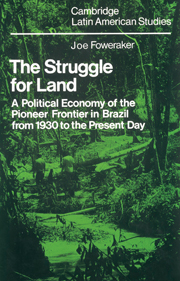 The Struggle for Land
The Struggle for Land Published online by Cambridge University Press: 29 October 2009
It has been established that the pattern of frontier expansion is not fortuitous, but proceeds in response to larger forces within the national economy. In particular political intervention and violence are seen to promote a specific process of accumulation, which contributes to national economic growth. The relationship between frontier and national economy is interpreted, in purely economic terms, as achieving a transfer of value from one to the other. But the moving frontier does more than merely feed the growth of the national economy through primitive accumulation. Frontier expansion extends the boundaries of this economy, and by its advance creates an economic, from a natural, environment. The frontier experience, the political intervention and the violence, is not merely the effect of specific production and exchange relations, but participates in a complex of such relations in the countryside, and can impose these relations. Therefore, in addition to a particular interpretation of the relationship of the frontier to the national economy, there exists a clear need for a broad conceptual scheme which can successfully locate the place of the frontier in the formation of the national economy – a global theory of frontier expansion.
By definition the frontier exists on the periphery of the economy, and the scheme of ‘centre–periphery’ relations seems a logical choice for the location of the frontier. But such a scheme is purely descriptive, and in practice is given very different conceptual contents (Balan 1974).
To save this book to your Kindle, first ensure [email protected] is added to your Approved Personal Document E-mail List under your Personal Document Settings on the Manage Your Content and Devices page of your Amazon account. Then enter the ‘name’ part of your Kindle email address below. Find out more about saving to your Kindle.
Note you can select to save to either the @free.kindle.com or @kindle.com variations. ‘@free.kindle.com’ emails are free but can only be saved to your device when it is connected to wi-fi. ‘@kindle.com’ emails can be delivered even when you are not connected to wi-fi, but note that service fees apply.
Find out more about the Kindle Personal Document Service.
To save content items to your account, please confirm that you agree to abide by our usage policies. If this is the first time you use this feature, you will be asked to authorise Cambridge Core to connect with your account. Find out more about saving content to Dropbox.
To save content items to your account, please confirm that you agree to abide by our usage policies. If this is the first time you use this feature, you will be asked to authorise Cambridge Core to connect with your account. Find out more about saving content to Google Drive.